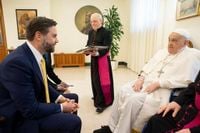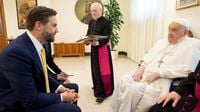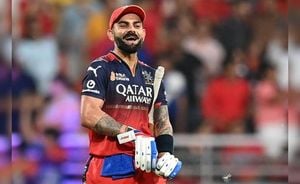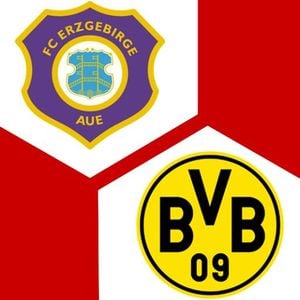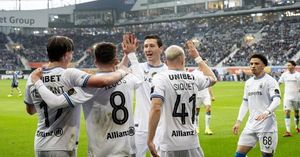Pope Francis welcomed U.S. Vice President J.D. Vance to the Vatican on Sunday, April 20, 2025, for a brief meeting that underscored the ongoing tensions between the two leaders regarding immigration policies. Vance, who has been in Rome since Friday, April 18, combined work with personal time during his visit, which included attending various religious ceremonies.
The meeting took place at Casa Santa Marta, the Pope's residence, and lasted just a few minutes. According to a statement from the Holy See, the purpose of the encounter was to exchange Easter greetings. This was particularly significant as it occurred during one of the most important celebrations for Christians around the world.
Despite the cordial nature of their greeting, the backdrop of their meeting was marked by a stark disagreement over immigration policies, particularly those enacted during the Trump administration. Vance, a convert to Catholicism in 2019, has been vocal in his support of these policies, which have drawn criticism from Pope Francis. The Pope has previously labeled such measures as a "disgrace," emphasizing the need for compassion towards migrants and refugees.
After meeting with Vance, the Pope, still recovering from a serious bout of bilateral pneumonia, addressed the public from the balcony of St. Peter's Basilica in a wheelchair. He delivered the traditional Urbi et Orbi blessing, a message directed to the city of Rome and the world. In his address, he expressed hope for peace and solidarity, particularly in regions affected by conflict.
During his Easter message, read by Monsignor Diego Ravelli, the Pope lamented the disregard often shown towards the weak, marginalized, and migrants. He called for peace in the Holy Land, expressing solidarity with Christians in Palestine and Israel, and denouncing the rising tide of antisemitism globally.
Vance's visit to the Vatican also included a meeting with Cardinal Pietro Parolin, the Vatican's Secretary of State, on Saturday, April 19, where they discussed various international issues, including humanitarian crises and the plight of migrants and refugees. The Vice President's discussions, however, did not include the Pope, who opted to rest due to his ongoing recovery.
The Pope's health has been a topic of concern, especially after his hospitalization for 38 days due to pneumonia. He has been gradually resuming his public duties, though still under medical advice to limit his activities. His previous audiences included meetings with King Charles III and Camilla, reflecting his intent to maintain diplomatic relations despite his health challenges.
In a letter sent to U.S. bishops in February, the Pope directly challenged Vance's theological justifications for the Trump administration's immigration policies. He emphasized that the Church's social doctrine strongly advocates for the dignity of all individuals, including migrants. The Pope's stance is a cornerstone of his papacy, which has consistently highlighted the importance of welcoming and protecting those in vulnerable situations.
Vance, while acknowledging the Pope's criticisms, has maintained his position, identifying himself as a "baby Catholic" who is still learning about his faith. The Vice President's alignment with the ultraconservative Catholic faction in the U.S. has often put him at odds with the Pope's more progressive viewpoints, particularly on issues of social justice and human rights.
The Pope's Easter message also included a call for an end to violence in conflict zones, urging for a ceasefire and humanitarian assistance in areas such as Gaza, Syria, and Ukraine. His remarks resonated with many, highlighting the Church's commitment to advocacy for peace and reconciliation amidst global turmoil.
As the world continues to grapple with various crises, the Pope's calls for compassion and understanding serve as a reminder of the moral responsibilities that come with leadership. His meeting with Vance, while brief, encapsulates the complexities of navigating faith, politics, and humanitarian issues in today's world.
In conclusion, Pope Francis's interactions with Vice President J.D. Vance reflect not only a personal greeting but also a broader dialogue on pressing global issues, particularly the treatment of migrants and the pursuit of peace. As both leaders continue their respective journeys, their differing views may shape the future of U.S.-Vatican relations.
